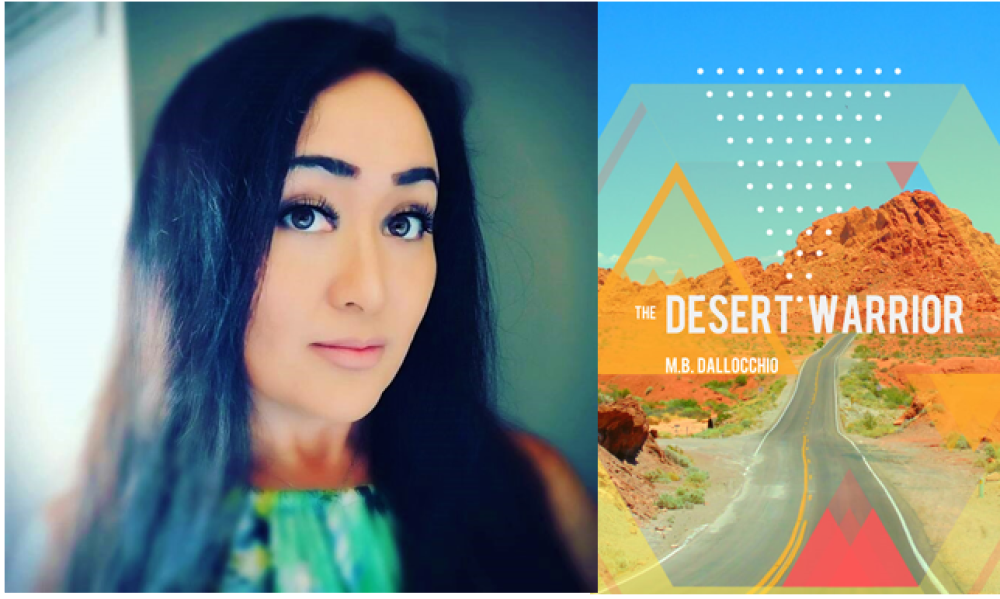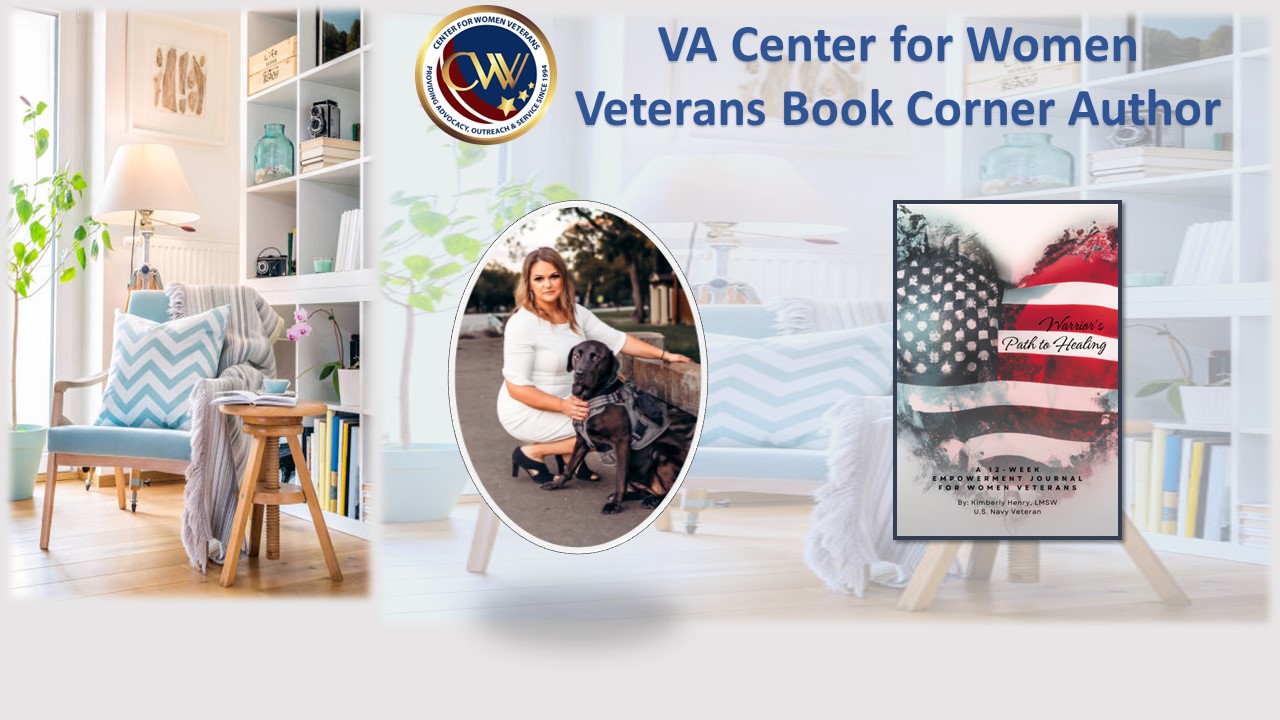Each month, VA’s Center for Women Veterans profiles a different woman Veteran author as part of its Women Veteran Authors Book Corner. This month’s author is Army Veteran M.B. Dallocchio, who served from 1998 to 2006.
Dallocchio’s service included a tour to Iraq in 2004-2005. She is the author of “The Desert Warrior,” a memoir that chronicles her journey home from the Iraq War. “The Desert Warrior” is a book filled with wanderlust along with tough lessons learned on love, loss and finding one’s purpose after a life filled with trauma. It sheds light on intersectional issues surrounding women Veterans of color and finding one’s authentic voice after military service.
The following comes from her interview with the Center for Women Veterans. It has been edited for style and clarity.
What are you doing now, after service?
I’m a licensed social worker specializing in artistic psychosocial rehabilitation. I’m a huge advocate of using creative outlets to express trauma and helping others find their authentic voice. Currently, I produce a YouTube series called “Veteran Art Studio” in addition to a channel entitled, “Arrivals & Departures,” which is a series based on my own international travel and what I’ve learned along the way. Being both a combat Veteran and now a social worker provides me with a unique lens where I come in with experiential knowledge of both trauma and evidence-based interventions.
What was your Military branch, career field, and years of service?
Army, 91B & 91X (Dual MOS), medic and mental health specialist, 1998-2006.
What were your tours, deployments, and campaigns (OIF, OEF, Vietnam, Gulf War, etc.)?
Northern Peru 2003; Ramadi, Iraq in 2004-2005 (OIF II-III).
What notable commendations did you receive?
In my book, I discuss how I was nominated for a Combat Action Badge but wasn’t awarded with it.
What was your fondest or proudest service memory?
Being one of the first women to participate in direct combat operations on Team Lioness and working with Iraqi women and children.
What was your inspiration for writing?
I began writing as a form of release for symptoms related to PTSD and depression. Since I wasn’t receiving VA care, I had to find other ways to cope with the aftermath of war and coming home while experiencing multiple forms of trauma from combat. After finding amazing care through the PTSD program at the Greater Los Angeles VA in 2019, even more creative doors opened. Getting quality care has undoubtedly added to my inspiration, and my upcoming novel is a testament to the invaluable presence of caring, high-caliber health care providers I encountered at GLA.
How has your military experience shaped your creativity or how you express yourself?
It has provided a source of motivation to continue working for justice and equality. It has also been a reminder to keep exercising my authentic voice, and to speak out in new, creative ways. Veterans like Medgar Evers, Josephine Baker, and Miguel Trujillo are my heroes. Their service continued by being powerful voices for the marginalized, and their legacy is a constant reminder why it’s imperative to persist.
What advice would you give other women Veterans who want to write?
Write. Don’t worry about whether it will be published by a mainstream publishing house or if it will be well-received by the community. Write for you. And who knows? It may very well end up being a survival guide or road map to recovery for another woman Veteran navigating a life after trauma. One of the greatest joys I’ve experienced in my own writing journey is having other women Veterans reach out and say, “Thank you for sharing your experience. It happened to me too, and I’m glad someone is finally talking about this.” You never know how your writing is going to help someone else, and even if it’s just one person, it makes the entire journey worthwhile.
How better can women Veteran authors help shape society’s understanding of women Veterans’ military experience and their contributions?
Women Veterans offer a unique perspective on a traditionally male-dominated field, but it’s also important to highlight that there are also so many other intersecting aspects of our identities. When our energies are channeled properly, we can affect policies, ensure others are not marginalized, and put social justice into action.
What obstacles and challenges did you face in writing this book?
Not getting support in the traditional publishing industry was the main obstacle, but I didn’t let that stop me. There will be people throughout life who will tell you something is impossible – until it’s done. So, I consider perseverance in this process from draft to publishing an incredible accomplishment.
What are your recommendations for illustrating, book cover selection, and the publishing process?
I did all of it myself, but I don’t recommend anyone to do all that alone! You must find people who can understand your overall vision – and having a great copy/content editor is priceless. There are also helpful apps out there from illustration to copy editing but having an extra pair of eyes on your work is helpful in spotting things you might not have.
How has writing this book helped you?
Once you invest the time and write your story, it becomes tangible. The painful memories don’t own you anymore. It becomes real and you’re in control of the pen, and through those memories becoming a tangible item like a book, it can be put away or revisited much easier. You don’t have to keep reliving everything for fear that traumas will happen again if you forget a few details. Write all the details down and allow them to go to sleep so you can, too. Is writing your story the cure-all? No, but it sure takes some of the weight out of one’s psychological ruck sack. And that alone has been an invaluable resource.
What is your favorite quote?
“I think we ought to read only the kind of books that wound or stab us. If the book we’re reading doesn’t wake us up with a blow to the head, what are we reading for? So that it will make us happy, as you write? Good Lord, we would be happy precisely if we had no books, and the kind of books that make us happy are the kind we could write ourselves if we had to. But we need books that affect us like a disaster, that grieve us deeply, like the death of someone we loved more than ourselves, like being banished into forests far from everyone, like a suicide. A book must be the axe for the frozen sea within us. That is my belief.” ― Franz Kafka
If you could choose one woman from any point in time to share a meal with, who would she be?
Frida Kahlo. She was way ahead of her time and revolutionary in her art and ideals.
Topics in this story
More Stories
At VA, we put women Veterans at the center of your care with a personalized Whole Health approach for your unique needs and goals.
This month's Center for Women Veterans Book Corner author is Navy Veteran Kimberly Henry, who served as a Cryptologic Technician and Sexual Assault Victim Advocate from 2009-2019. She created "Warrior's Path to Healing: A 12-Week Empowerment Journal for Women Veterans."
Thinking about building a family or exploring fertility treatments? VA can support you with a wide range of services.







I love this!
Nice interview! M.B. is the best of the best when it comes to Female writers AND Veteran writers!